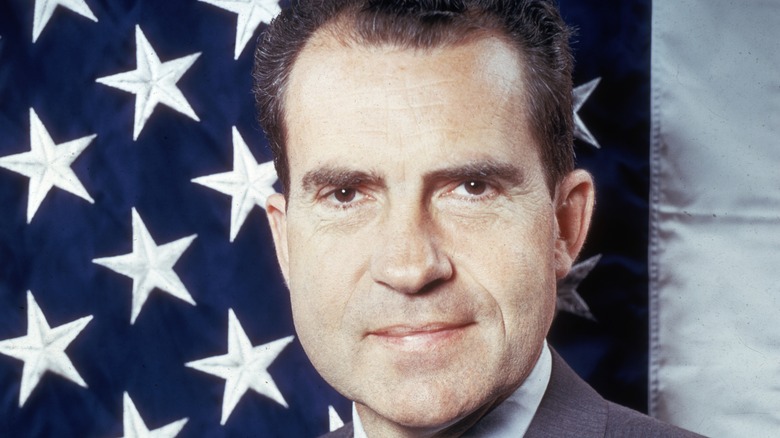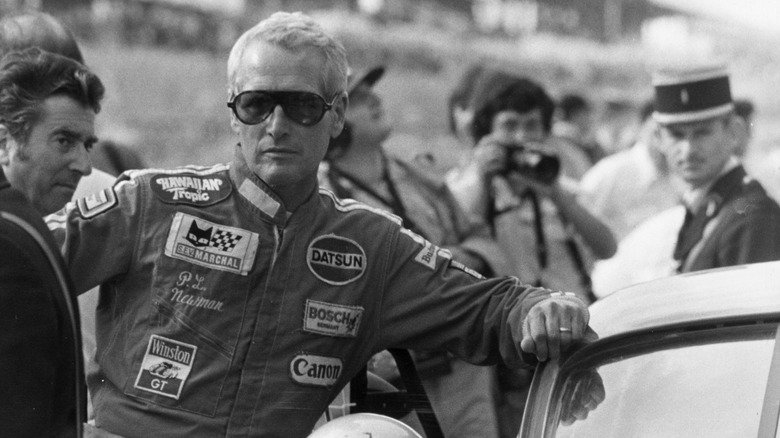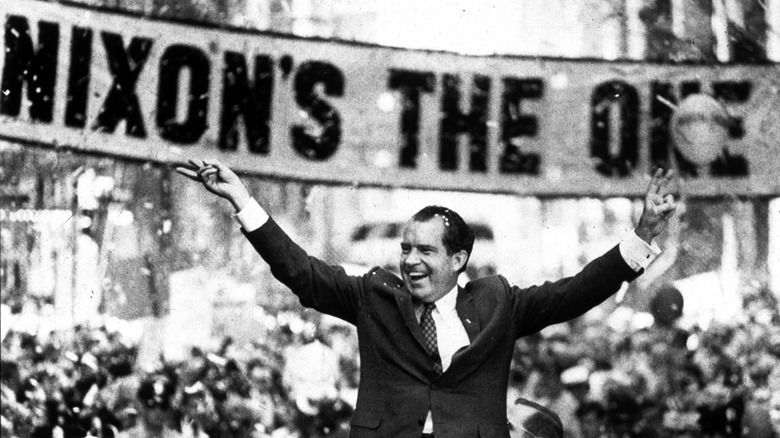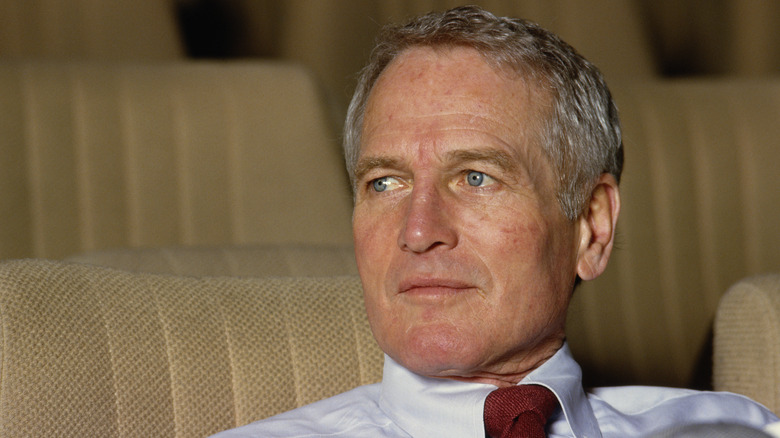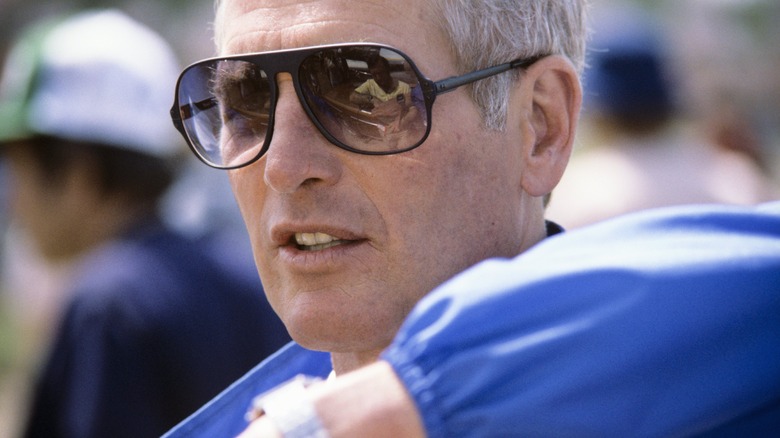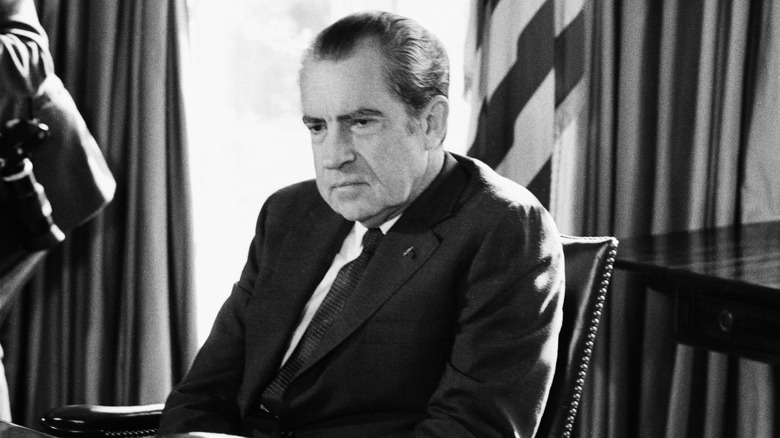The Mystery Of Why Paul Newman Showed Up On Richard Nixon's Opponents List
Paul Newman and Richard Nixon were two of the biggest names of the 1960s and 1970s, only for drastically different reasons. The blue-eyed Newman was known for being one of Hollywood's most popular leading men, while Nixon was a leading man — being the President of the United States and all — only he was just a smidge more divisive than Newman. Just a smidge.
History buffs will recall that in the early 1970s, Richard Nixon found himself embroiled in the Watergate scandal. It led to his eventual downfall and resignation, which helped him avoid being removed from office through imminent impeachment proceedings in what amounts to the presidential version of saying "you can't fire me — I quit!" One of the juicy tidbits that emerged from the ensuing investigation was Nixon's "Opponents List." According to Business Insider, it's exactly what it sounds like — a list of those Nixon and his administration deemed to be a threat. On that list was one Paul Newman.
Paul Newman was a Renaissance man
Paul Newman was a well-rounded guy. He had a laundry list of iconic film roles, including the titular role in "Cool Hand Luke," Butch Cassidy in "Butch Cassidy and the Sundance Kid," Charlestown Chiefs player-coach Reggie Dunlop in "Slap Shot," and even Doc Hudson in the Pixar movie "Cars." Speaking of cars, Newman was also a racecar driver, and not a just-there-for-fun gentleman driver, either — he spent years as a driver in the Trans-AM series and even became the oldest class-winner in the history of the 24 Hours of Daytona, per Alt Driver.
Newman also started his own company — Newman's Own — in the early '80s, and since then, his famous visage has graced many a bottle of salad dressing and other products. According to Biography, the company has donated over $250 million to charities worldwide. What was less publicized, according to Politico, was that Newman was a strong backer of the Democratic Party and an early supporter of the Civil Rights Movement.
Richard Nixon's political hunger
Richard Nixon served as vice president under President Dwight D. Eisenhower. Before that, he had been a Republican congressman from California (via Biography). He earned the Republican Party's nomination in the 1960 Presidential Election, and it may have been a pretty straightforward path to the presidency had he not encountered a virtually unstoppable political force in the form of a Massachusetts Senator named John F. Kennedy.
Nixon sat out the 1964 election — opting instead for an ill-fated run for governor in California — while Lyndon Johnson won handily, stomping Republican challenger Barry Goldwater (via Britannica). However, by 1968, his thirst for the highest office in the nation remained unquenched, and he launched a campaign ahead of that year's election. Nixon managed to win the race over Hubert Humphry thanks in large part to the issues surrounding the war in Vietnam and a Democratic Party in complete disarray after the assassination of Robert Kennedy and a party convention marred by protests and violence (via History).
Paul Newman's political views and the '68 election
Paul Newman — like a huge portion of the country at the time — opposed the Vietnam War. According to The Vintage News, he was also vocal about his other political stances, which included the promotion of gay rights and banning of nuclear weapons.
Leading up to the 1968 presidential election, Newman put his initial support behind Minnesota Representative Eugene McCarthy, who had an ardent stance against further American involvement in the Vietnam War. McCarthey wound up winning the New Hampshire primary so handily that it led to Lyndon Johnson bowing out of the race and dropping his reelection bid (via Britannica).
However, there was a curveball ahead, as at the controversial 1968 Democratic Convention, the party nominated Vice President Hubert Humphrey, despite his absence from primary ballots. Nonetheless, Newman supported Humphrey in the election, which Richard Nixon won handily, thanks in large part to the schism in the Democratic Party over civil rights and desegregation (via 270 To Win). This clash caused Alabama governor George Wallace to campaign as a third-party candidate who ended up doing well among southern Democrats, which pulled votes from Humphrey.
Paul Newman, Richard Nixon, and a Jaguar
While it's most likely that Paul Newman wound up on Richard Nixon's Opponents List by being a popular and vocal supporter of Democratic politicians and polices, a story from a biography of Paul Newman — called, appropriately enough, "Paul Newman: A Biography," by Marian Edelman Borden — may point to an additional, more personal reason for his inclusion on the famous list.
Given his love of racing, Paul Newman was a big car guy, and according to The Vintage News, he was friends with a car dealer who distributed Jaguars, the famous British sportscar brand. Because it was a good way of marketing the cars, Newman was loaned any Jaguar he wanted and drove the car from Friday to Sunday. Newman eventually learned that the person who drove the same car on Tuesdays and Wednesdays just happened to be Richard Nixon. This prompted Newman to leave a note with a reference to Nixon's notorious nickname, "Tricky Dick," which read, "Dear Mr. Nixon, You should have no trouble driving this car. It has a tricky clutch. Paul Newman."
That seems funny and pretty harmless to most people, but Richard Nixon might not have seen it that way.
Nixon's Opponents List
According to Business Insider, Richard Nixon's infamous list was originally drafted by his special assistant George T. Bell and was written as a memo to White House Counsel John Dean, who then revealed it at trial. The outlet noted that Bell had written in the first part of the memo that the list was intended to detail "how we can use the available federal machinery to screw our political enemies."
The list featured 20 names ordered by priority, with descriptions of each opponent listed below their name. Paul Newman made the list in the 19th spot out of 20. The list dated August 16, 1971, just over a year before the 1972 presidential election in which Nixon made an ultimately successful reelection bid. In his description, it appears that the Nixon camp expected Newman to carry a large amount of power when it came to swaying public opinion.
His description on the list reads as follows: "Paul Newman, California: Radic-lib causes. Heavy McCarthy involvement '68. Used effectively in nationwide T.V. commercials. '72 involvement certain." But Newman wasn't dismayed by his inclusion on the list. In fact, after his death in 2008, his daughter, Nell Newman, told Today he loved it. "He was tickled pink and framed it," she said.
